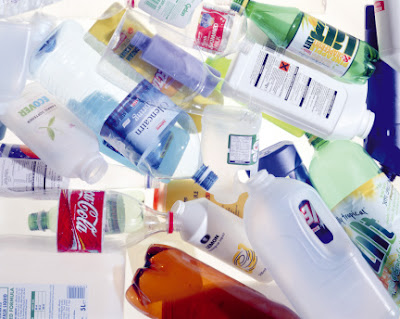
Now take a look at this excerpt from an article entitled "Get Plastic Out Of Your Diet":"Today there are no babies born without measurable levels of phthalates," says Dr. Shanna Swan, director of the Center for Reproductive Epidemiology at the University of Rochester School of Medicine and Dentistry. Phthalates, which are used to give flexibility to pvc (a.k.a. plastic—though it's rarely labeled), turn up in bath and teething toys, shower curtains, upholstery, flooring, medical equipment, and countless other products, including cosmetics. Animal studies have linked phthalates to the same genital abnormalities that are now among the most common birth defects in American baby boys. "We're not yet sure what level of exposure produces these adverse effects, but they are a real concern," explains Dr. Paul Foster, a senior researcher at the National Toxicology Program.
But please, read the whole articles. I can't do them justice with short excerpts. The ubiquitous nature of plastics in our world just may have something to do with the increase in Alzheimer's, cancer and obesity. Maybe we really need to pay attention.I spent about two years answering telephone inquiries at an environmental organization in Berkeley. A great number of the callers asked what the safest plastic to use in contact with food or water is. They also wanted to know what the safest plastic is to microwave food in. My answer was that plastic should never contact food. And that one should never microwave food — it's probably as bad or worse than putting it in plastic because it creates free radicals in the food that damage cells in your body. It also heats the plastic, thus increasing the rate of migration into the food. That answer wasn’t popular with either the caller or the organization, which likes to point out positive alternatives. However, plastic is the alternative! And glass, wood, metal, and ceramics are the real things. Plastic is merely a foul imitation thereof. By using the least offensive plastic, one only prolongs and increases the toxic load on the Earth and in our bodies. If saving trees is your aim, stop using so much stuff. But in the mean time, don’t further degrade the environment with more plastic.
As consumers, we always look for ways to maintain the status quo of our modern lives. However, the only logic I can see in the regulation of food contact plastics is profit at the expense of our health, the economy, society, and environment. You needn’t be a polymer scientist to know that plastic shouldn’t contact food. What is essential though is a firm standing in reality and a good grip on logic. It also requires being free of ties to the industry before that logic becomes evident.

I am just beginning an attempt to lessen the amount of plastic I use - beginning with plastic grocery bags and containers for food. But it is a challenge. Plastic is everywhere. Kathleen
ReplyDelete